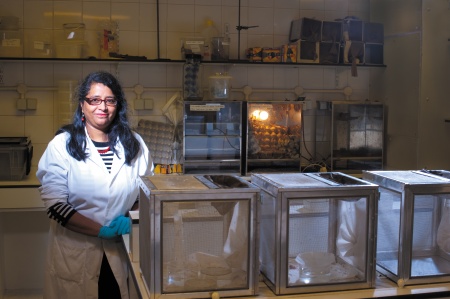Tuesday, 26 April 2022
A scientist from the University of Nottingham has received nearly £2.5million from the European Research Council (ERC), to continue her research into the understanding of rapid atypical cell division, which could help to control transmission of malaria.
Professor Rita Tewari from the School of Life Sciences at the University is one of only 253 leading researchers from across Europe who will receive the funding as part of the ERC’s 2021 Advanced Grants Competition.
The grants are designed to support excellent scientists and scholars in any field within Europe, who are established research leaders with a recognised track record of research achievements.
Rita Tewari is a Professor of Parasite Cell Biology. Her research focuses on the molecular players involved in the transmission and development of the malaria parasite - one of the biggest killers in the world.
The funding from this grant will enable Professor Tewari and her team to better understand unusual cell division of the malaria parasite, and how this could be used to control the transmission of the disease.
Cell division is a fundamental process that enables an organism to proliferate, propagate and survive. The molecules controlling the process, in terms of the cell cycle and chromosome replication and segregation are well studied in many model organisms, including yeast, Drosophila and humans. However, these models represent only a limited view of the diversity of eukaryotic cell division.
 Professor Rita Tewari
Professor Rita Tewari
Professor Tewari said: “In a world where transmission of pathogens, drug resistance and global warming is alarming, our understanding of the molecular mechanisms of apicomplexan malaria parasite replication and transmission is limited and needs to be improved substantially.
“I am therefore delighted to receive this funding to help unravel this important area of scientific research. This is my dream project and I hope to deliver a new integrated, holistic view of parasite rapid and unconventional cell division and broaden our understanding and importance of evolutionarily conserved and divergent mechanisms of cell division. The study will also help to reveal potential targets for intervention in the control of malaria.”
Professor Dame Jessica Corner, the Pro-Vice-Chancellor for Research and Knowledge Exchange at the University, said: “Professor Tewari’s research into malaria is truly life changing, and we are immensely proud of everything she has achieved to date. This highly coveted and prestigious grant from the ERC is further testimony to the importance of the work she does, and the University is delighted that it will enable her to further forward her work into the future eradication of this awful disease.”
Story credits
More information is available from Professor Rita Tewari from the School of Life Sciences rita.tewari@nottingham.ac.uk
Notes to editors:
About the University of Nottingham
Ranked 24 in Europe and 15th in the UK by the QS World University Rankings: Europe 2024, the University of Nottingham is a founding member of Russell Group of research-intensive universities. Studying at the University of Nottingham is a life-changing experience, and we pride ourselves on unlocking the potential of our students. We have a pioneering spirit, expressed in the vision of our founder Sir Jesse Boot, which has seen us lead the way in establishing campuses in China and Malaysia - part of a globally connected network of education, research and industrial engagement.
Nottingham was crowned Sports University of the Year by The Times and Sunday Times Good University Guide 2024 – the third time it has been given the honour since 2018 – and by the Daily Mail University Guide 2024.
The university is among the best universities in the UK for the strength of our research, positioned seventh for research power in the UK according to REF 2021. The birthplace of discoveries such as MRI and ibuprofen, our innovations transform lives and tackle global problems such as sustainable food supplies, ending modern slavery, developing greener transport, and reducing reliance on fossil fuels.
The university is a major employer and industry partner - locally and globally - and our graduates are the third most targeted by the UK's top employers, according to The Graduate Market in 2024 report by High Fliers Research.
We lead the Universities for Nottingham initiative, in partnership with Nottingham Trent University, a pioneering collaboration between the city’s two world-class institutions to improve levels of prosperity, opportunity, sustainability, health and wellbeing for residents in the city and region we are proud to call home.
More news…